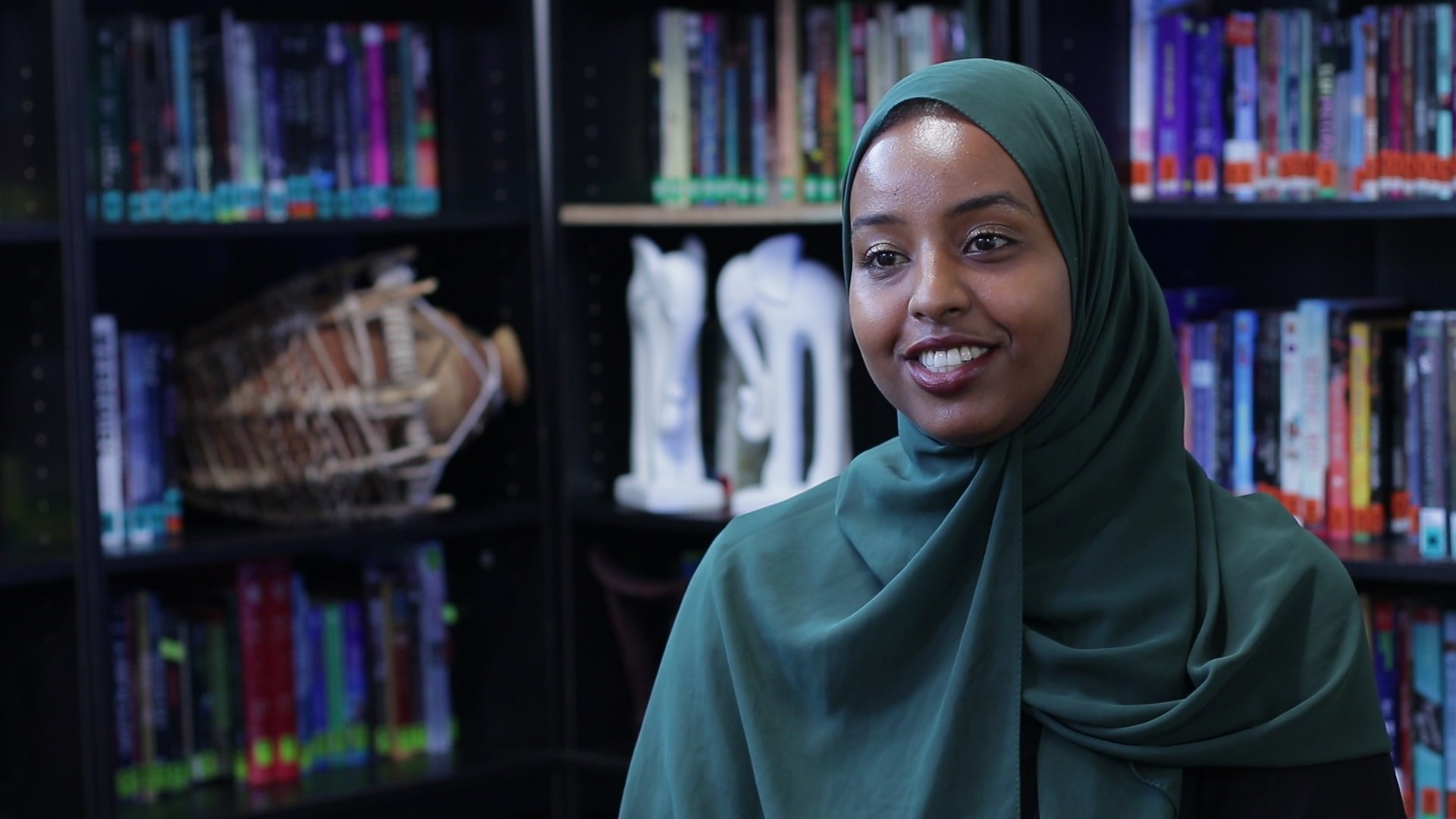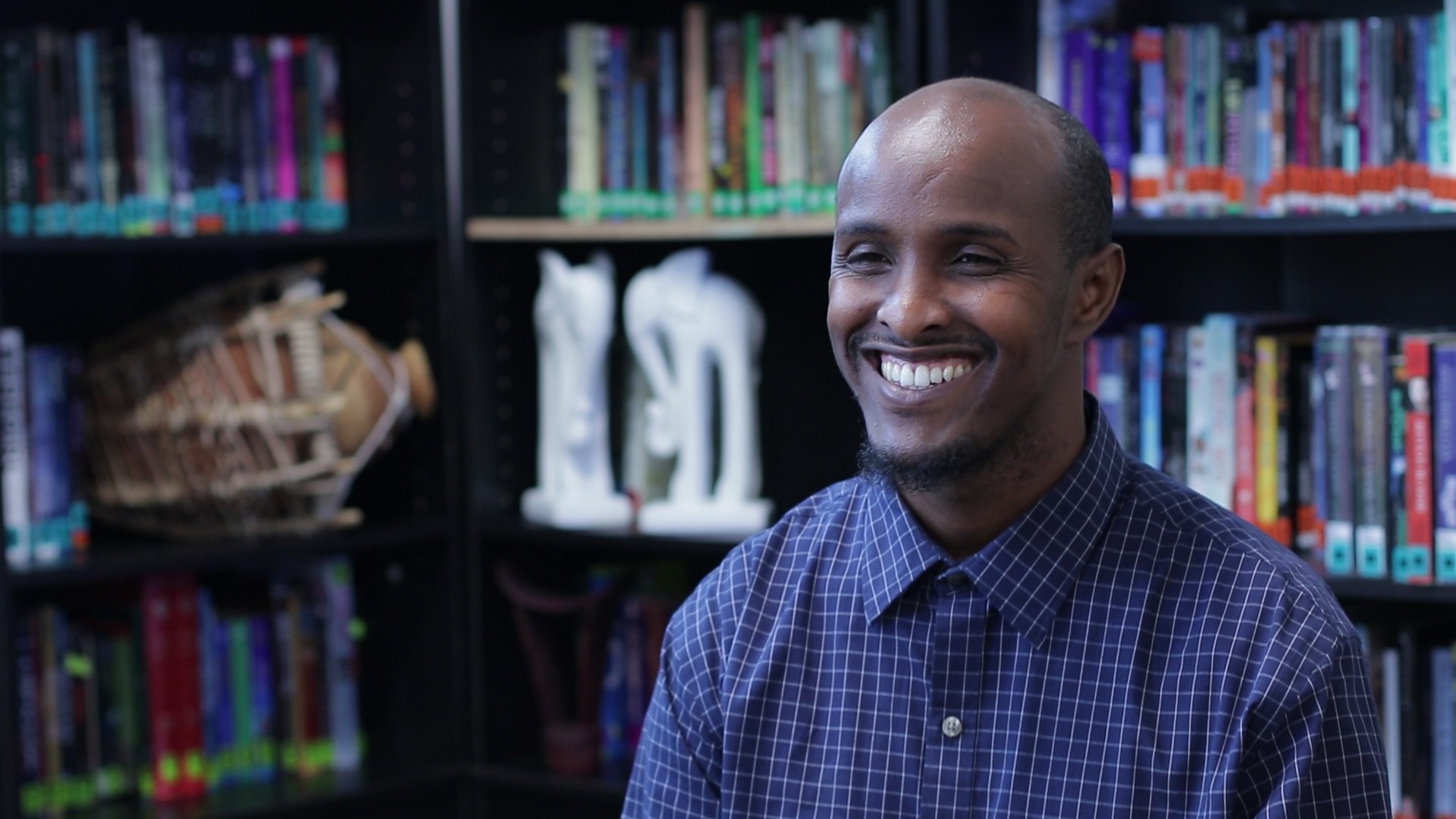Commercial Tobacco Use
Tobacco Topics
- Behavioral Health and Commercial Tobacco
- COVID-19 and Commercial Tobacco
- E-cigarettes and Vaping
- Flavored Commercial Tobacco Products
- Menthol Commercial Tobacco Products
- Nicotine and Nicotine Dependence
- Secondhand Smoke and Aerosol
- Traditional and Sacred Tobacco
Related Topics
Contact Info
Community Education: A Powerful Strategy for Reversing Tobacco Trends
WellShare International is partnering to overcome high rates of commercial-tobacco use in Minnesota’s East African communities
Growing up in East Africa, many adults in Abdillahi Kahin’s family smoked tobacco. “Honestly, I thought that is what adults do when they grow up, and that I would smoke tobacco when I grew up.” Today, Kahin, who is the Program Coordinator of WellShare International’s East African Smoke-Free Program, educates teens about the harms of tobacco. “I talk to young people about staying away from it—that people using tobacco are addicted.”
Many people in Minnesota’s East African community emigrated from areas where tobacco use is relatively high due to tobacco industry targeting, few tobacco regulations, and a lack of information on tobacco’s harms. It is estimated that 24 percent of East Africans in Minnesota smoke cigarettes or hookah compared to 13.8 percent of Minnesota’s overall population. In response, raising awareness among East Africans of the harms of tobacco and nicotine addiction is one of the primary aims of the WellShare program.
 “We use a multifaceted approach to tobacco education and policy change, primarily within the large Twin Cities Somali community, but also with Eritreans, Oromos, and others,” said Laura Sanka, International Program Director at WellShare. “We provide education in the schools, offer resources and guidance to businesses wanting to institute tobacco-free policies, and encourage festivals and other community events to do the same. The menthol ban is now in effect in Minneapolis, and we talk to people about the benefits of increasing the age for buying tobacco to 21.”
“We use a multifaceted approach to tobacco education and policy change, primarily within the large Twin Cities Somali community, but also with Eritreans, Oromos, and others,” said Laura Sanka, International Program Director at WellShare. “We provide education in the schools, offer resources and guidance to businesses wanting to institute tobacco-free policies, and encourage festivals and other community events to do the same. The menthol ban is now in effect in Minneapolis, and we talk to people about the benefits of increasing the age for buying tobacco to 21.”
WellShare is supported in their efforts as one of eleven recipients of a Tobacco-Free Communities (TFC) Grant from the Minnesota Department of Health. TFC is a program to reduce smoking, prevent youth commercial tobacco use, and address tobacco-related disparities in Minnesota. The TFC grant program is part of a growing movement to promote community-driven tobacco prevention and control activities and strategies.
Culturally-specific outreach aims at community-wide changes
“I’m very well aware of how normalized tobacco use is in our community,” observed Zahra Bashir, a Community Health Worker at WellShare. “This kind of active fight against tobacco is essential because there is this attitude in our community that tobacco use isn’t that bad for your health. There are a lot of misperceptions about tobacco that we need to tackle and reverse.”
 One common misunderstanding is that smoking hookah, a type of water pipe popular among East Africans for smoking and socializing, isn’t as harmful as smoking cigarettes. However, according to the Centers for Disease Control and Prevention (CDC), smoking hookah for one hour is the equivalent of smoking 100-200 cigarettes and carries the same risks as cigarette use. “A lot of people are shocked to hear that,” said Sanka.
One common misunderstanding is that smoking hookah, a type of water pipe popular among East Africans for smoking and socializing, isn’t as harmful as smoking cigarettes. However, according to the Centers for Disease Control and Prevention (CDC), smoking hookah for one hour is the equivalent of smoking 100-200 cigarettes and carries the same risks as cigarette use. “A lot of people are shocked to hear that,” said Sanka.
WellShare is working with religious and community leaders, and medical providers to spread the word about tobacco and hookah. In addition, Bashir visits gathering spots for the Somali community, such as malls and coffee shops.
“At the Somali malls, I go to the henna shops or the hair salons. I recently went to a place where professional makeup artists host events like bridal shower parties. There you see hookah use during the hours that pass while waiting” to meet with the makeup artist, said Bashir. “My visit was really successful, and I was able to reach a population that you just can’t reach on the street or at a health fair.”
Changing perceptions through youth tobacco education
Bashir and Kahin teach a teen-centered “Tobacco 101” curriculum to 9th grade students at Metro Schools College Preparatory in Minneapolis and high school students at several other locations in the Twin Cities. It covers the addiction and illnesses caused by nicotine, describes the thousands of chemicals contained in commercial tobacco, and raises awareness of tobacco advertising targeting the community. The lessons also identify the wide range of tobacco products, including hookah (also known as “shisha”) and vaping products like JUUL, which often use added fruit and candy flavors known to entice young people and give the impression the products are harmless.
“Oftentimes, young people will say ‘I didn’t know tobacco is dangerous,’ or ‘I didn’t know that shisha was not actually a fruit,’” noted Kahin. “Their stories tell us we are changing perceptions.”
 The biggest impact that Metro Schools teacher Elizabeth Stokes has seen is that the students continue talking about the topic after they leave the classroom. “They want to be there, engaging in the conversation, and I think that’s really impressive.”
The biggest impact that Metro Schools teacher Elizabeth Stokes has seen is that the students continue talking about the topic after they leave the classroom. “They want to be there, engaging in the conversation, and I think that’s really impressive.”
One of WellShare’s recent activities with students was a PhotoVoice project. “We gave the students cameras and asked them to go out into the community and take pictures of how tobacco is affecting them, how it hits close to home,” recalled Bashir; then they wrote messages to go with the photos and shared them at a community photo exhibit. Among the images, Bashir noted the large number of cigarette butts the students found and photographed. She emphasized that young people are learning that tobacco affects the environment as well as health. “The students were like, ‘Wow, it really is everywhere.’”
Kahin added, “One student took a picture of a bank near us and used the PhotoVoice project to show that tobacco is powerful because of how much money is involved.”
Leveraging community values to create a tobacco-free future
Part of WellShare’s education work asks East Africans to remember their social values around health and wellness.
 “We don’t want shisha to be part of our culture. Our culture encourages people to be healthy. Our religion encourages people not to use things that are harmful to you,” said Kahin. “We want to remember the positive things we do in our culture, like soccer. We remind young people that smoking tobacco or shisha affects your lungs and negatively affects your ability to be a good soccer player.”
“We don’t want shisha to be part of our culture. Our culture encourages people to be healthy. Our religion encourages people not to use things that are harmful to you,” said Kahin. “We want to remember the positive things we do in our culture, like soccer. We remind young people that smoking tobacco or shisha affects your lungs and negatively affects your ability to be a good soccer player.”
Going forward, the East African Smoke-Free Program will continue to use culturally-based messages and strategies to reduce tobacco disparities in the community. They hope that using this approach through their youth education, community outreach, and smoke-free policy work will lead to changes in the community’s norms around tobacco use. “We will educate East Africans and engage the community to actively change their attitudes and practices,” said Bashir. “Success for me will be seeing a younger generation that is tobacco-free.”
Learn more about WellShare International at wellshareinternational.org.
Download this story: Community Education: A Powerful Strategy for Reversing Tobacco Trends (PDF)
More stories about community grantees
The Tobacco-Free Communities Grant Program funds local community grants and technical assistance and training grants that aim to reduce and prevent youth tobacco use and address tobacco-related disparities in Minnesota by promoting community-driven tobacco prevention and control activities and strategies.
Learn more about the Tobacco-Free Communities Grant Program and read grantee stories featuring their work throughout Minnesota communities.